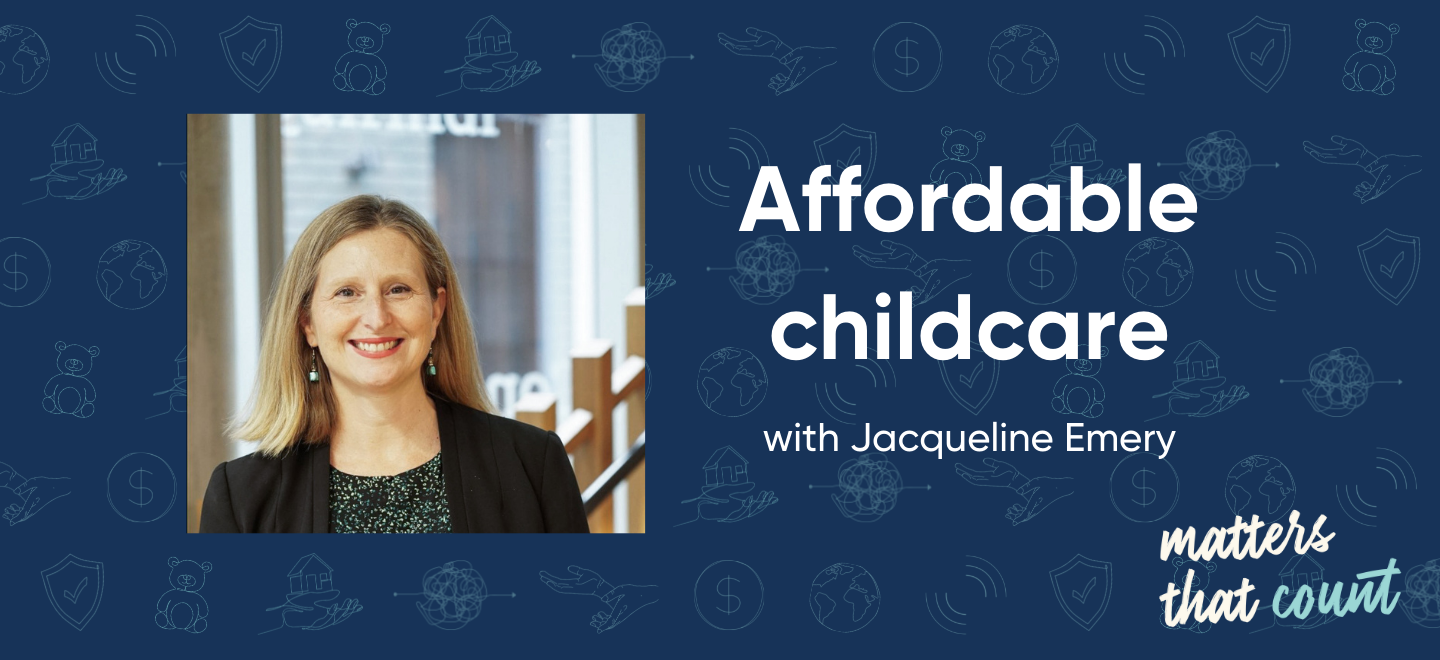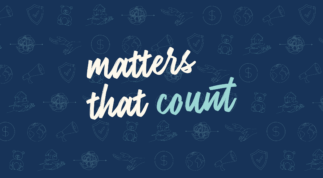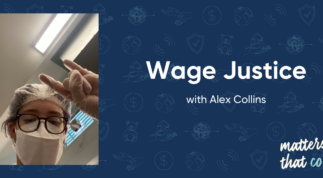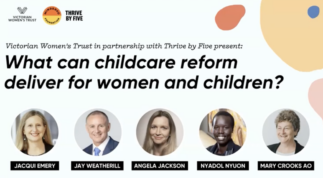Matters That Count: Jacqueline Emery on Affordable Childcare for All Families

Matters That Count is an initiative that calls on groups of like-minded friends to get together and screen their federal election candidates, asking them to declare their hand on 8 core matters that, we believe, go to the heart of who we are as thoughtful, compassionate citizens.
One of these matters is Affordable childcare for all families, calling for a re-design of Australia’s childcare system to one providing universal, high quality and affordable early childhood learning and care.
Jacqueline Emery is the CEO of Royal Far West, Australia’s only national charity for the health and wellbeing of country children. She writes below about the childcare gap for kids in regional and rural areas, the importance of early learning for children’s development, as well as for women’s workforce participation.
One in five children start school not ready to learn. For country kids it is twice that number and for First Nations children, half start school with developmental challenges.
Those figures are from the 2018 Early Development Census, taken before the COVID pandemic hit. It’s almost certainly worse now.
Access to high quality early childhood education and care (ECEC) is the key to reducing these damning statistics.
While country children, families and communities face rural life, including repeated devastation from drought, bushfires and floods, with incredible resilience, urgent action is required to ensure that children’s life trajectories are not irrevocably altered by the events of the past two years.
The COVID-19 pandemic has made rural and remote families even more isolated, exacerbating the challenge.
Federal and state governments have the power to make the “lucky” country stronger, healthier, and fairer than before. But it will only happen if they prioritise investment in children, and particularly early childhood services, to give every child an equal start when they reach school age.
COVID-19 has put a spotlight on how important early childhood services are in families’ lives.
Royal Far West estimates there are 180,000 children in rural and remote areas that need support for their development and future wellbeing. During the past four years, double the number of children receiving RFW services are presenting with trauma factors.
Research shows 90 percent of the size of our brains develops before the age of five and early years shape our whole futures. Early learning is a transformational opportunity where highly trained and skilled educators help children develop social, interpersonal, and cognitive skills for life.
The economic and gender arguments are just as compelling, which is why early learning reform is the centrepiece of the campaign for gender equality from a formidable women’s group, Women for Progress, that I’m pleased to be part of.
In Australia, The Front Project has estimated that high-quality early education in the year before school would generate $4.1 billion in healthcare savings, $1.1 billion in reduced crime costs and $1.7 billion in higher tax revenue from additional earnings.
Reducing the barriers to accessing early education like availability, accessibility and high out-of-pocket costs, will allow women who want to pick up more hours or return to work to do so.
Childcare and school provide important protective factors for all children, particularly the most vulnerable. It is the “invisible children” that need our support most.
They are not turning up in the health system and are often not identified as struggling until well into primary school.
Early childhood educators can and do play a critical role in identifying children who are developmentally vulnerable so families can seek life-changing early intervention for their long-term health, education, and wellbeing.
The right intervention at the right time can change a child’s life. RFW’s modelling suggests the lifetime economic return of developmental interventions for children identified as needing support early, is $3.10 for every $1 invested.
Country kids don’t have the same opportunities for early learning or early intervention as city kids. They face a ‘double disadvantage’ by living in areas with the greatest social and economic disadvantage in the nation. Longer waiting lists, further distances to services, and higher costs severely hinders access to the supports they need.
Right now, more than half of regional, rural and remote families are unable to easily access childcare. And a nation-wide shortage of educators and high staff turnover bites harder in the bush with a bigger struggle to recruit and keep quality staff.
Families travel further to reach early learning, often splitting care between providers in different towns. Paying more for transport and taking time off work adds to the unaffordability of childcare in the bush. As women are predominately the primary care givers, they feel the impact most. Rural businesses need women in the workforce if they’re to have a fighting chance to recover from the natural disasters of the last few years. COVID-19 only intensified this need.
It’s long overdue for all levels of government across all political parties to unite on early childhood education and wrap around services. During the pandemic, we’ve seen examples of how beneficial government action can be for families. It’s now time to make a commitment to long term early learning reform.
Early learning is an investment into children’s development, women’s workforce participation, and economic recovery that pays for itself many times over. Governments must urgently provide a childcare solution for country families regardless of their income or postcode.
For decades to come, the fate of rural and remote communities will depend on what governments do for our children. Now is the time to put in place a guarantee to make Australia the lucky country in which to raise a child.
 Jacqueline Emery has been the CEO of Royal Far West since 2021, and served as its Executive Director for Business, People and Culture in the 4 years preceding. She is also on the Board of the National Rural Health Alliance. She has a long and distinguished record of energetic and effective leadership in start-ups, large listed and private companies and not-for-profits. Prior to joining Royal Far West she held leadership roles in some of Australia’s most well-known organisations including The Australian Institute of Company Directors (AICD); Australian Financial Review Group and Reader’s Digest.
Jacqueline Emery has been the CEO of Royal Far West since 2021, and served as its Executive Director for Business, People and Culture in the 4 years preceding. She is also on the Board of the National Rural Health Alliance. She has a long and distinguished record of energetic and effective leadership in start-ups, large listed and private companies and not-for-profits. Prior to joining Royal Far West she held leadership roles in some of Australia’s most well-known organisations including The Australian Institute of Company Directors (AICD); Australian Financial Review Group and Reader’s Digest.
Authorised by Mary Crooks, Victorian Women’s Trust, 200 Alexandra Pde, Fitzroy VIC 3065.
Next Up

Introducing Matters That Count
BlogImagine. Candidates with the best chance of winning Lower House seats in the forthcoming federal election are asked by constituents where they stand on a...
Read more
Matters That Count: Alex Collins on Wage Justice
BlogHear from aged care worker and VWT volunteer on why wage justice matters to her this election year.
Read more
Watch: VWT x Thrive By Five - What can childcare reform deliver for women and children?
BlogTo celebrate International Women's Day on 8 March 2022, the Victorian Women's Trust, in partnership with Thrive By Five ran a discussion event with panelists...
Read more